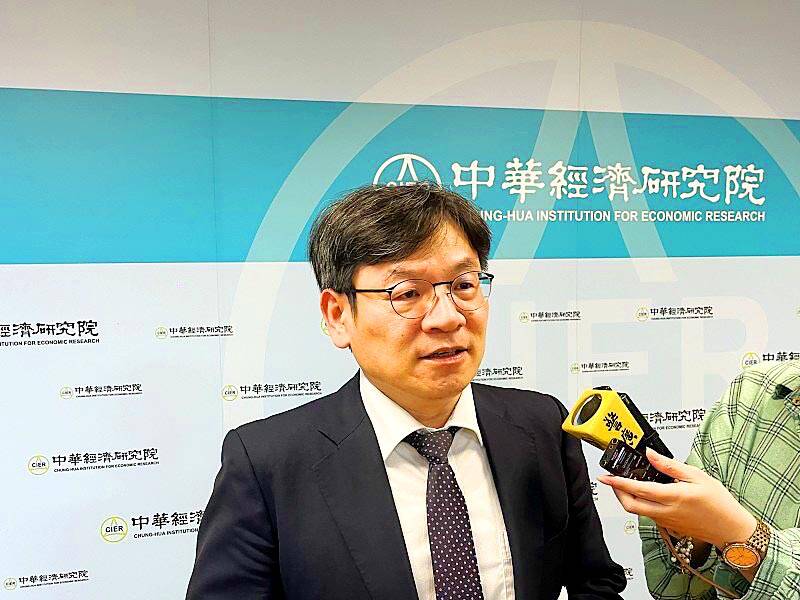Chung-Hua Institution for Economic Research (CIER, 中華經濟研究院) yesterday raised its forecast for Taiwan’s GDP growth from 3.1 percent to 3.38 percent, as exports could receive a bigger boost from global artificial intelligence (AI) demand.
“The nation’s exports would start to set sail from this quarter, thanks to better order visibility,” CIER president Yeh Chun-hsien (葉俊顯) said.
Exports, the main growth driver that accounts for 60 percent of GDP, would shift from a 9.8 percent decline last year to a 7.89 percent increase this year, as inventory adjustments come to a close, the think tank said.

Photo: Hsu Tzu-ling, Taipei Times
The low base last year would also help and explain why the recovery momentum would ease off quarter by quarter, Yeh said.
GDP growth is predicted to reach 5.57 percent last quarter, and to slow to 3.55 percent this quarter, 3 percent next quarter and 1.66 percent in the final quarter, he added.
Global AI demand has been stronger than expected and would ramp up businesses of local tech firms on its supply chain, Yeh said.
Revenue from AI server chips would more than double this year and would account for 20 percent of overall sales by 2028 from a contribution that is currently in the low teens, Taiwan Semiconductor Manufacturing Co (TSMC, 台積電) told investors on Thursday.
Yeh said the upward revision also aims to reflect an increase in government expenditure that would expand 2.68 percent this year to build up national defense and armament procurements.
Private consumption would register a healthy 2.09 percent gain, falling from an 8.32 percent uptick, as demand for outbound travel holds sturdy, especially after an earthquake which measured a 7.2 on the Richter scale jolted Hualien on April 3 and is expected to hinder tourism in eastern Taiwan, Yeh added.
CIER has a dim view on private investment, saying that the GDP component would shrink 0.2 percent this year after a deep 11.6 percent retreat last year.
Local firms remain cautious about capital spending, as the US Federal Reserve appears unlikely to cut interest rates anytime soon and Taiwan’s central bank last month unexpectedly raised borrowing costs by 0.125 percentage points, Yeh said.
Sticky inflation and spiking geopolitical tensions lent support to a conservative approach, he added.
CIER is looking at an inflation of 2.3 percent, which is above the central bank’s 2 percent alarm, mitigating little from a 2.49 percent rise last year.

MULTIFACETED: A task force has analyzed possible scenarios and created responses to assist domestic industries in dealing with US tariffs, the economics minister said The Executive Yuan is tomorrow to announce countermeasures to US President Donald Trump’s planned reciprocal tariffs, although the details of the plan would not be made public until Monday next week, Minister of Economic Affairs J.W. Kuo (郭智輝) said yesterday. The Cabinet established an economic and trade task force in November last year to deal with US trade and tariff related issues, Kuo told reporters outside the legislature in Taipei. The task force has been analyzing and evaluating all kinds of scenarios to identify suitable responses and determine how best to assist domestic industries in managing the effects of Trump’s tariffs, he

TIGHT-LIPPED: UMC said it had no merger plans at the moment, after Nikkei Asia reported that the firm and GlobalFoundries were considering restarting merger talks United Microelectronics Corp (UMC, 聯電), the world’s No. 4 contract chipmaker, yesterday launched a new US$5 billion 12-inch chip factory in Singapore as part of its latest effort to diversify its manufacturing footprint amid growing geopolitical risks. The new factory, adjacent to UMC’s existing Singapore fab in the Pasir Res Wafer Fab Park, is scheduled to enter volume production next year, utilizing mature 22-nanometer and 28-nanometer process technologies, UMC said in a statement. The company plans to invest US$5 billion during the first phase of the new fab, which would have an installed capacity of 30,000 12-inch wafers per month, it said. The

‘SWASTICAR’: Tesla CEO Elon Musk’s close association with Donald Trump has prompted opponents to brand him a ‘Nazi’ and resulted in a dramatic drop in sales Demonstrators descended on Tesla Inc dealerships across the US, and in Europe and Canada on Saturday to protest company chief Elon Musk, who has amassed extraordinary power as a top adviser to US President Donald Trump. Waving signs with messages such as “Musk is stealing our money” and “Reclaim our country,” the protests largely took place peacefully following fiery episodes of vandalism on Tesla vehicles, dealerships and other facilities in recent weeks that US officials have denounced as terrorism. Hundreds rallied on Saturday outside the Tesla dealership in Manhattan. Some blasted Musk, the world’s richest man, while others demanded the shuttering of his

Taiwan’s official purchasing managers’ index (PMI) last month rose 0.2 percentage points to 54.2, in a second consecutive month of expansion, thanks to front-loading demand intended to avoid potential US tariff hikes, the Chung-Hua Institution for Economic Research (CIER, 中華經濟研究院) said yesterday. While short-term demand appeared robust, uncertainties rose due to US President Donald Trump’s unpredictable trade policy, CIER president Lien Hsien-ming (連賢明) told a news conference in Taipei. Taiwan’s economy this year would be characterized by high-level fluctuations and the volatility would be wilder than most expect, Lien said Demand for electronics, particularly semiconductors, continues to benefit from US technology giants’ effort